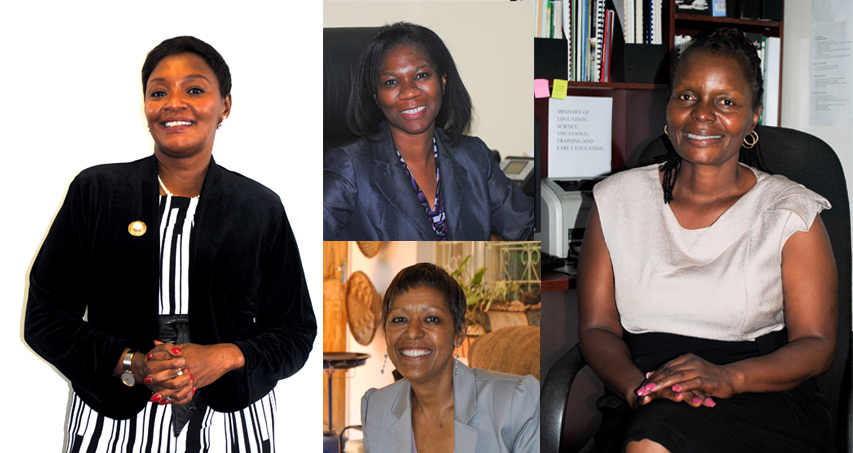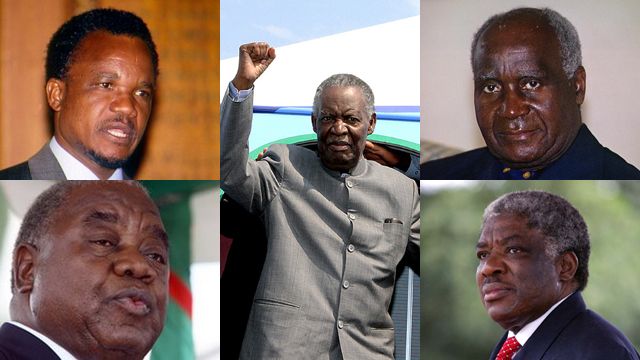
| Betty Kaunda, 84, former First Lady and wife of Zambia’s founding president, Kenneth Kaunda, died early Wednesday September 19, in Zimbabwe while visiting her eldest daughter. The former First Lady was found dead in her bedroom.
Fondly remembered as the mother of the nation and referred to as ‘Mama Betty’ by Zambians, she led a private and ordinary life after leaving State House. She is said to have been ailing with diabetes for the last 60 years.
Dr Kaunda, who was visiting South Africa when news of her death was announced, travelled to Zimbabwe to be by his deceased wife. Mama Betty and Dr Kaunda, had the previous month celebrated their 66th wedding anniversary with family and friends. They married in 1946.
During the liberation struggle, Mama Betty was a strong family pillar as, Dr Kaunda, was most of the time in and out of prisons at the hands of the colonialist. As the struggle for liberation heightened Mama Betty found herself offering refuge to freedom fighters and their families.
Mama Betty was born Beatrice Kaweche Banda in Chinsali on November 17, 1928 and grew up in Mpika. Her father was Kaweche Banda while the mother was Milika Sakala Banda.
She went to school at Mbereshi Girls and worked as a teacher in Mufulira after her training at Mindolo Ecumenical Foundation.
Mama Betty was honoured by President Michael Sata in May this year for her contribution to the independence struggle. Mama Betty was accorded a state funeral.
She is survived by her husband the first republican president of Zambia Dr Kenneth Kaunda, and 8 children, 38 grandchildren and 17 great grandchildren.
| 
| George Kunda, SC, former republican vice president died on April 16 at UTH. He had been admitted to the hospital for an undisclosed illness and died at around 16:00 hours of a heart attack.
The son of a miner, George Kunda, SC was born on February 26, 1956 in Luanshya. A Lawyer by profession, the late Kunda began his career working for Luanshya District Council. During his illustrious career, he became president of the Law Association of Zambia (LAZ).
He was introduced to politics by late republican president Levy Mwanawasa in 2001, who had nominated him to parliament and subsequently appointed him Justice minister and attorney general in 2002.
His career culminated in his appointment as the vice president of the Zambian Republic from 2008 until 2011, when the MMD under president Rupiah Banda lost last year’s elections to Michael Sata’s Patriot Front party.
Kunda will be remembered as a committed lawyer and politician who would not cower from a position he believed in. He defended his stance on many key national issues, irrespective of the barrage of criticism hurled his way.
President Sata, who described the death of George Kunda as heartbreaking, declared three days of national mourning in his honour. The late Kunda lay in state for two days at Mulungushi International Conference. His burial at Embassy Park in Lusaka was preceded by a valedictory session at the High Court before a requiem mass at the Catholic Cathedral of the Child Jesus.
Kunda was MMD member of Parliament for Muchinga until his death. He is survived by his wife Irene and children.
| 
| Princess Nakatindi Wina, 67, died April 5 after a long battle with a heart condition. The Princess was evacuated to South Africa by government, after it became evident she required urgent specialist medical attention. Close members of her family, including her husband veteran politician and businessman Sikota Wina, were by her bedside when she died.
A public figure on Zambia’s political arena, Princess Nakatindi’s constant political maneuvers always caught the public and media’s attention. A member of the Barotse Royal Family, she hails from a family with a rich political pedigree.
Princess Nakatindi was the first female member of parliament after independence in 1964. Her political career began with United National Independence party (UNIP). Under UNIP Princess Nakatindi was parliamentary secretary of Labour and Social Development from 1964-1968 and in
1968-1973 parliamentary secretary of Co-operatives, Youth and Social Development.
Her political career would span 5 decades and saw her belong to three political parties including the Movement for Multiparty Democracy (MMD), and later on the United Party for National Development (UPND) before rejoining the MMD from where she finally retired from politics.
She was a member of parliament for Sesheke in Western Province and later Kanyama in Lusaka.
The Princess and her husband are considered key actors in ushering democracy into Zambia in 1991, under the MMD.
In MMD, second republican president, the late Fredrick Chiluba appointed Princess Nakatindi to serve as Tourism minister from 1992-1993 and minister of Community Development and Social Services from 1994-1998. She also held the portfolio of national chairperson for Women.
Her ability to challenge the status quo in times of political strife earned Princess Nakatindi’s two detentions among other challenges. The first detention was in 1985 under first republican president Kenneth Kaunda. Her second detention was by president Fredrick Chiluba in 1997, he accused her of treason, a charge she vehemently denied and for which she was acquitted.
Never a wallflower, Princess Nakatindi was as much a fashion trendsetter as she was outspoken.
The late Princess Nakatindi body was flown to Mwandi in Sesheke for burial after a church service at the Cathedral of the Holy Cross in Lusaka. President Sata declared April 13 a day of national mourning in her honour.
Princess Nakatindi Wina is survived by her husband, five children and grandchildren.
| 
| Mundia Sikatana, 77, former Agriculture and Co-operatives minister in the Movement for Multi-party Democracy (MMD) administration died June 14 following an illness.
Sikatana was admitted to the University Teaching Hospital’s on June 13 before being discharged and again re-admitted in the main intensive care unit after his condition worsened.
A lawyer by profession, during the one party rule under first president Dr Kaunda, Sikatana was one of the fearless lawyers who championed the cause for justice and the respect of human rights.
During president Levy Mwanawasa’s reign, Sikatana was appointed Agriculture and Co-operatives minister in 2002 until 2006. At that time, Zambia suffered a severe staple food shortage of maize and came under tremendous pressure for refusing Genetically Modified (GM) food aid being offered by the United States. Sikatana insisted upon the provision of non-GM food aid fearing contamination of the local crop. He handled this difficult situation admirable and not a single Zambian life was lost due to lack of access to natural, non-GM maize. Since then Zambia has gone on to make good progress in its food production without any use of GMOs. It has produced bumper maize harvests from 2006.
Upon the re-election of Mwanawasa in 2006, Sikatana was appointed foreign minister. A year later in 2007, Mwanawasa fired him, citing Sikatana’s declining health. However, on 3 September, Sikatana refuted that claim, saying that it was his stance as an anti-Mugabe politician and Mwanawasa’s improved relationship with Mugabe following his appointment as head of the Southern African Development Community that resulted in his sacking.
Under the MMD, Sikatana contested the Mongu Central constituency seat unsuccessfully. Sikatana served as Zambia Daily Mail board chairman.
In recognition of his service to the nation President Michael Sata declared the day of his burial June 19 as national mourning.
Sikatana is survived by a wife, Monde and five children .
| 
| Stephen Manjata, 67, former minister of Community Development and Social Welfare died Sunday October 14, at Lusaka Trust Hospital after an illness.
Manjata was former Luampa member of Parliament.
Early in his political career, Manjata played a role as an activist in the UNIP youth wing. He later joined the MMD in 1991, during which time he played a role in bringing back multiparty democracy. He was a great grassroots organiser who was able to interact with everyone from the lowest to the highest levels in society.
Manjata was born on March 5, 1945 and was promoted to the position of Cabinet minister on March 24, 2005, after serving as deputy minister in the Ministry of Energy and Water Development from January 11, 2002 to 2005. He also served as deputy minister in the Ministry of Information and Broadcasting Services and Ministry of Environment and Natural Resources under the Chiluba administration in 1992 and 2001 respectively.
As a local entrepreneur in his home town of Kaoma, Manjata created employment for the people through his timber business.
Government accorded the former minister a day of national mourning and a state funeral in recognition of his service to the country. He was buried at Old Mulamatila cemetery in Kaoma district, in Western province.
He leaves behind a wife, 17 children and more than 30 grandchildren.
| 
| Oswell Munyenyembe, 59, Miners Union of Zambia (MUZ) president, died February 7, in a road traffic accident along the Ndola-Kitwe dual carriageway.
He had been MUZ president since November 2011. He held various positions in the MUZ for the past 24 years, including one short period previously as president, and since 2006 served as general secretary. He started in 1988 as a shop steward for the MUZ Butondo branch at ZCCM and became chairman for the MUZ Mufulira branch in 1990. He won election unopposed as president of MUZ on 4 November 2011.
Born in Muyombe in 1954, he did his secondary education in Malawi and studied architecture at Zambia Institute of Technology, now called Copperbelt University.
Munyenyembe worked as a draftsman for the then Zambia Consolidated Copper Mines (ZCCM), and continued his union activism while working at Mopani Copper.
He was a passenger in a Toyota Prada that was operated by his driver when the vehicle lost control and overturned. He died enroute to the Wusakile Hospital in Kitwe.
His sudden death was seen as a huge loss by both the employees and the management of the mining sector. He was considered a brave, courageous and mature leader.
His funeral was held in Mufulira on 11 February. Munyenyembe is survived by six children and his wife Charity.
| 
| Reverend Fostone Dziko Sakala, the founding president of the Foundation for Democratic Process (FODEP) died on Tuesday June 12 at UTH after an illness.
Reverend Sakala would be remembered for, among other things, his contribution to the formation of FODEP and dedication to its cause.
In addition, he served in a multitude of organisations including as chairman and trustee of the Bible Society of Zambia, president of the Christian Council of Zambia, board member at World Vision Zambia, chairman and board member at Multi-Media Zambia and executive committee member of the Reformed Ecumenical Council among others.
In 1990/91, a while before the multi-party democracy storm engulfed Zambia, he showed rare courage by telling the all-powerful KK, that the era of one party participatory democracy was no longer sustainable in Zambia recalls Rev Dr Japhet Ndhlovu, of Kenya, in his tribute to Rev. Sakala.
Rev Sakala was an ordained minister of the Word and Sacraments in the Reformed Church in Zambia (RCZ) until he retired at 65.
He was put to rest at Kanakantapa in Lusaka East and is survived by his wife Emelia and 9 children.
| 
| Dev Babbar, 72, passed away September 24 at CFB hospital where he had been admitted in a critical condition at the hospital’s Intensive Care Unit.
Babbar was a member and a former president of the Zambia Association of Manufacturers. During his tenure Babbar called for greater technological transfer between foreign investors and local manufacturers.
He is survived by his wife Raj Babbar and three children.
|
|











